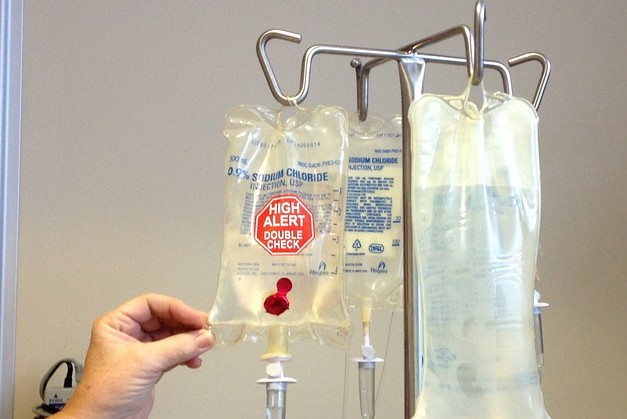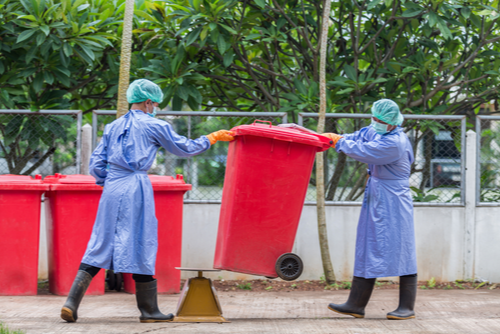Guardians of Sanitation: Citizen Medical Waste Removal Service for Your Satisfaction
Guardians of Sanitation: Citizen Medical Waste Removal Service for Your Satisfaction
Blog Article
Stay Ahead of Laws: Specialist Advice on Medical Waste Disposal
In a globe where the medical care industry is continuously advancing, it is necessary for medical facilities to remain in advance of guidelines when it involves the correct disposal of clinical waste. With stringent guidelines and constant regulative changes, it can be challenging to browse the intricacies of this procedure. With professional guidance, facilities can guarantee compliance and mitigate risks linked with inappropriate waste disposal. From recognizing the various classifications of medical waste to executing the best collection and segregation methods, this conversation will certainly supply useful insights and actionable tips to help centers remain ahead of regulations in the ever-changing landscape of clinical garbage disposal.
Understanding Clinical Waste Categories
Understanding medical waste categories is crucial for appropriate disposal and management in health care centers. Medical waste describes any waste produced by medical care activities that might pose a risk to public wellness or the environment. It is vital to categorize medical waste properly to ensure its risk-free handling, treatment, disposal, and transport.
There are numerous categories of clinical waste that healthcare centers require to be accustomed to. The most usual categories consist of infectious waste, pathological waste, sharps waste, pharmaceutical waste, and chemical waste. Each group has certain guidelines and guidelines for its proper monitoring and disposal.
Pathological waste refers to human cells, organs, or body parts that require unique handling and disposal. Drug waste consists of ended, unused, or polluted drugs that need mindful handling and disposal.
Remaining Up-To-Date With Regulatory Modifications
Staying current with governing adjustments is essential for healthcare facilities to ensure conformity and appropriate administration of clinical waste disposal. medical waste removal. With regulations constantly progressing, it is necessary for health care centers to remain updated to stay clear of penalties, fines, and potential injury to the environment and public health
To remain ahead of regulative modifications, health care centers must establish a system for surveillance and tracking updates. This can be done by subscribing to governing e-newsletters, attending conferences and workshops, and actively joining sector organizations. Furthermore, facilities must mark a team member or team accountable for staying notified and disseminating information to relevant stakeholders.
Routine interaction with regulatory companies is also crucial. Medical care centers should develop partnerships with local, state, and government agencies to ensure they recognize any kind of changes in policies that may impact their waste administration practices. This can be done via routine meetings, engagement in public remark durations, and proactive engagement with governing companies.
In addition, healthcare centers ought to take into consideration partnering with waste administration firms that concentrate on clinical garbage disposal (medical waste disposal services with WasteX). These companies are often fluent in the current policies and can offer support and assistance to make certain compliance
Executing Appropriate Collection and Partition Techniques
To properly take care of clinical garbage disposal, medical care centers must develop correct collection and partition approaches in conformity with regulatory standards. Implementing these methods ensures the safe handling and disposal of potentially hazardous materials, safeguards the atmosphere, and reduces the risk of infections and injuries to health care workers and the public.
Correct collection and partition methods entail the usage of assigned containers and identifying systems. Healthcare facilities need to give clearly labeled containers for various kinds of medical waste, such as sharps, infectious waste, pharmaceutical waste, and non-hazardous waste. These containers should be color-coded and plainly marked to avoid complication and promote easy recognition.
Furthermore, healthcare centers must train their staff on the proper treatments for gathering and setting apart clinical waste. This includes educating them on the various types of waste, the appropriate containers to use, and the value of complying with guidelines and guidelines. Normal training sessions and correspondence course ought to be performed to make sure that employee remain current on best techniques.
Moreover, healthcare centers should develop a system for regular collection and disposal of medical waste. This might include partnering with licensed waste monitoring business that specialize in clinical garbage disposal. These companies will make certain that the gathered waste is transferred and dealt with in conformity with regulatory demands.
Choosing the Right Disposal Approaches

Incineration is just one of one of the most usual and efficient approaches for throwing away particular kinds of medical waste, helpful hints such as pathological waste and sharps. It includes the regulated burning of waste at high temperature levels, lowering it to ash. Incineration can launch hazardous pollutants into the air and add to air contamination.

Various other disposal techniques include chemical therapy, microwave treatment, and landfilling. Chemical treatment entails the use of chemicals to reduce the effects of the waste and disinfect. Microwave treatment utilizes microwave power to warm and decontaminate the waste. Landfilling includes hiding the waste in a designated land fill location (medical waste disposal services with WasteX). Landfilling ought to be the last resort due to the prospective threat of contamination to dirt and groundwater.
Making Sure Conformity With Paperwork and Training
After very carefully taking into consideration the ideal disposal approaches for clinical waste, medical care centers have to make certain conformity with regulations and minimize ecological influence by implementing reliable documents and training treatments. This action is crucial in maintaining a lasting and safe setting for both healthcare workers and the public.

Health care workers who handle medical waste should receive appropriate training on waste partition, dealing with, and disposal procedures. By offering detailed training, medical care centers can encourage their personnel to make enlightened decisions and reduce the danger of incorrect waste disposal.
Conclusion
Finally, staying in advance of guidelines in medical garbage disposal is crucial for health care facilities. medical waste removal. Understanding the various categories of medical waste, staying updated with governing adjustments, carrying out appropriate collection and segregation approaches, picking the ideal disposal approaches, and ensuring conformity through documentation and training are all crucial actions. By following these standards, health care organizations can properly get rid of and manage of clinical waste in a accountable and safe fashion
From comprehending the different classifications of medical waste to carrying out the best collection and partition techniques, this discussion will certainly offer actionable pointers and useful insights to aid centers stay in advance of policies in the ever-changing landscape of clinical waste disposal. - medical waste disposal services with WasteX
The most usual categories consist of infectious waste, pathological waste, sharps waste, pharmaceutical waste, and chemical waste. Medical care facilities must provide plainly identified containers for various kinds of clinical waste, such as sharps, transmittable waste, pharmaceutical waste, and non-hazardous waste. Healthcare facilities ought to establish an extensive system to tape and track all elements of medical waste disposal, including kinds of waste created, quantities, and disposal techniques made her comment is here use of. Health care employees who handle clinical waste needs to obtain ideal training on waste partition, handling, and disposal treatments.
Report this page